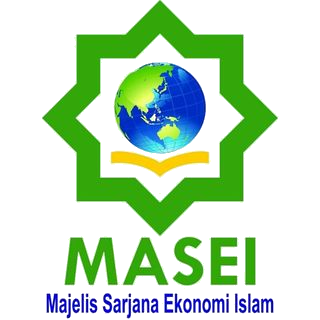Islamic Economic Empowerment Model During The Covid 19 Pandemic In Lazismu Surakarta
Saiev Dzaky El Kemal(1*), Qurroh Ayuniyyah(2), Rio Erismen Armen(3), Mufti Maula Alfani(4)(1) Ibn Khaldun University of Bogor
(2) Ibn Khaldun University of Bogor
(3) Sekolah Tinggi Ekonomi Islam SEBI Depok
(4) Islamic University of Madinah
(*) Corresponding Author
Abstract
The COVID 19 pandemic is a new challenge for the Islamic economy to be able to be a solution to various problems that arise due to the impact of the spread of the COVID 19 virus in every community. The impact caused by the pandemic is not only on the health aspect but also on the economic aspect. This study aims to find out what are the models of economic empowerment in the Islamic Economy that can be done during the COVID 19 pandemic. The research method used is qualitative descriptive. This method explains the phenomena that occur in society and then a conclusion is drawn. The results of this study are the first, the empowerment model carried out by LAZISMU Surakarta during the pandemic has been in accordance with government rules, namely the funds are distributed to those who are entitled to receive it legally Islamic and also pay attention to the scale of community priorities. Second, the category of consumptive empowerment is 11% greater than productive empowerment. Third, the benefits obtained by the community from consumptive empowerment are greater when the number of pandemic cases is increasing, while when the trend of confirmed case numbers is falling, productive empowerment is more expected by the community. Fourth, the Islamic Economy is still able to play a role in tackling emergencies such as the COVID 19 pandemic. This is evidenced through LAZISMU Surakarta which has been able to empower people's funds professionally.
Keywords
Full Text:
PDFReferences
Aeni, N. (2021). Pandemi COVID-19: Dampak Kesehatan, Ekonomi, & Sosial. Jurnal Litbang: Media Informasi Penelitian, Pengembangan Dan IPTEK, 17(1). https://doi.org/10.33658/jl.v17i1.249
Ahmad, T. (2022). Pertumbuhan Ekonomi Indonesia di Masa Pandemi Covid-19. Muttaqien, 3(1).
Almahmudi, N. M. (2020). Implikasi Instrumen Non-Zakat (Infaq, Sedekah, dan Wakaf) terhadap Perekonomian dalam Perkembangan Hukum Ekonomi Syariah. Al-Huquq: Journal of Indonesian Islamic Economic Law, 2(1). https://doi.org/10.19105/alhuquq.v2i1.3002
Arifqi, M. M. (2019). Konsep Empowerment Sebagai Instrumen Pembangunan Ekonomi Islam (Telaah Kritis Pemikiran Ibnu Khaldun dan Umer Chapra). Al-Tijary, 4(2). https://doi.org/10.21093/at.v4i2.1356
Ceylan, R. F., Ozkan, B., & Mulazimogullari, E. (2020). Historical evidence for economic effects of COVID-19. In European Journal of Health Economics (Vol. 21, Issue 6). https://doi.org/10.1007/s10198-020-01206-8
Guan, W., Ni, Z., Hu, Y., Liang, W., Ou, C., He, J., Liu, L., Shan, H., Lei, C., Hui, D. S. C., Du, B., Li, L., Zeng, G., Yuen, K.-Y., Chen, R., Tang, C., Wang, T., Chen, P., Xiang, J., … Zhong, N. (2020). Clinical Characteristics of Coronavirus Disease 2019 in China. New England Journal of Medicine, 382(18).
Hafidhuddin, D. (2012). Islam dan Penanggulangan Kemiskinan. Jurnal Ekonomi Islam Al-Infaq, 3(1).
Hendri, T., & Devi, A. (2013). Metodologi penelitian ekonomi islam. Jakarta: Gramata Publishing.
Irawan, E. (2020). Potensi Zakat Dalam Pengentasan Kemiskinan. Nusantara Journal of Economics, 2(1).
Khaerunisa, S., Yayuli, Y., & Febriandika, N. R. (2021). Analysis of the Impact of Covid-19 on the Collection of Zis Funds (Zakat, Infaq and Shodaqoh) in Lazismu Surakarta in 2020. Proceedings Book The International Conference on Islamic Economics, Islamic Finance, & Islamic Law (ICIEIFIL) 2021.
Kusno, F. (2020). Krisis Politik Ekonomi Global Dampak Pandemi Covid-19. Anterior Jurnal, 19(2). https://doi.org/10.33084/anterior.v19i2.1495
Mardiyah, Rahma Ainul., Nurwati, R. Nunung. (2020). Dampak Pandemi Covid-19 Terhadap Peningkatan Angka Pengangguran di Indonesia. Jurnal Global Health Science Groupoup, 1(1).
Mascie Taylor, N., & Moji, K. (2021). Pandemics. In Journal for Peace and Nuclear Disarmament (Vol. 4, Issue S1). https://doi.org/10.1080/25751654.2021.1880769
Murti, A. (2018). Pengelolaan Lembaga Amil Zakat Infaq dan Shadaqah Muhammadiyah Banyumas Dalam Pemberdayaan Ekonomi Umat Perspektif Ekonomi Islam (Master's thesis, Universitas Islam Indonesia).
Nina, S., Untoro, R. D., & Yafi, R. S. (2021). Dampak Pandemi Covid-19 Terhadap Pelayanan Kesehatan Rumah Sakit di Indonesia. Jurnal Kesehatan, 12(1).
Qardhawi, Y. (2016). Norma dan Etika Ekonomi Islam. In Gema Insani (pp. 1–257).
Qiu, W., Rutherford, S., Mao, A., & Chu, C. (2017). The Pandemic and its Impacts. Health, Culture and Society, 9. https://doi.org/10.5195/hcs.2017.221
Rohmah, N. (2021). Adaptasi Kebiasaan Baru Di Masa Pandemi Covid-19. Al-MIKRAJ: Jurnal Studi Islam Dan Humaniora, 1(2).
Susila, A. A. (2018). Pengelolaan Zakat di Indonesia. Iqtishodiyah: Jurnal Ekonomi dan Bisnis Islam, 4(2).
Sugiyono. (2017). Metode Penelitian Kuantitatif, Kualitatif, dan R&D. Alfabeta.
Teguh Ali Fikri, Y. (2021). Analisis Peningkatan Angka Pengangguran akibat Dampak Pandemi Covid 19 di Indonesia. Indonesian Journal of Business Analytics, 1(2). https://doi.org/10.54259/ijba.v1i2.59
Tho’in, M. (2015). Konsep Ekonomi Islam Jalan Tengah (Kapitalis – Sosialis). Jurnal Ilmiah Ekonomi Islam, 1(03). https://doi.org/10.29040/jiei.v1i03.34
Widiastuti, T., Auwalin, I., Rani, L. N., & Ubaidillah Al Mustofa, M. (2021). A mediating effect of business growth on zakat empowerment program and mustahiq’s welfare. Cogent Business and Management, 8(1). https://doi.org/10.1080/23311975.2021.1882039
Wölfel, R., Corman, V. M., Guggemos, W., Seilmaier, M., Zange, S., Müller, M. A., Niemeyer, D., Jones, T. C., Vollmar, P., Rothe, C., Hoelscher, M., Bleicker, T., Brünink, S., Schneider, J., Ehmann, R., Zwirglmaier, K., Drosten, C., & Wendtner, C. (2020). Virological assessment of hospitalized patients with COVID-2019. Nature, 581(7809). https://doi.org/10.1038/s41586-020-2196-x
Yayuli, Y., Athief, F. H. N., & Utari, D. N. (2021). Studi Komparatif Pemikiran Yusuf Qardhawi dan Sahal Mahfudh Tentang Zakat Produktif Sebagai Sarana Pemberdayaan Ekonomi. Profetika: Jurnal Studi Islam, 1(1), 98-113.
Article Metrics
Abstract view(s): 304 time(s)PDF: 261 time(s)
Refbacks
- There are currently no refbacks.
















